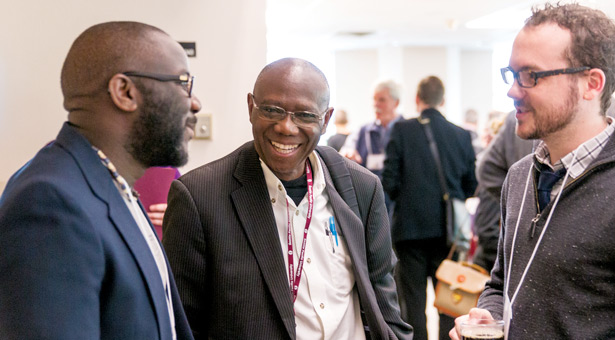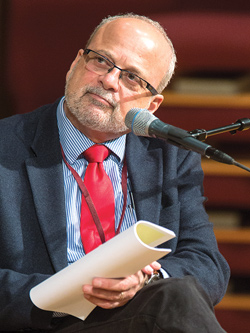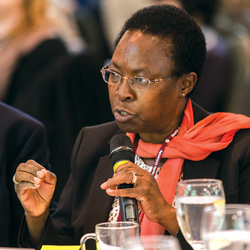The World Acting Globally
Testimonies of Transformation
International Scholars and Leaders Bear Witness to Reconciliation at SPU
By Jeffrey Overstreet (jeffreyo@spu.edu) | Photos by Daniel Sheehan
 Guest speaker David Kasali (center) at the “For Such a Time as This” conference.
Guest speaker David Kasali (center) at the “For Such a Time as This” conference.
Speaking to the Seattle Pacific University community and church leaders gathered at Seattle's First Free Methodist Church, David Kasali, president of the Congo Initiative, offered a personal observation: Lamentation, he said, can be a gift that leads to vision, action, and hope.
“For Such a Time as This” — a conference exploring the challenges of hope and reconciliation in the contexts of global crises and conflicts — took place at SPU from April 23—25, 2015. Organized by SPU’s John Perkins Center for Reconciliation, Leadership Training, and Community Development, the conference hosted speakers from ScholarLeaders International, an organization that supports Christian leaders in the majority world as they pursue post-graduate education.
 Salim Munayer
Salim Munayer
 Gladys
Mwiti
Gladys
Mwiti
Kasali spoke of how, while working in his prestigious position as the president of Africa International University, he learned of the deaths of his brother, sister, and pregnant niece — casualties in the Congo war that cost more than 5.4 million lives since 1998, according to an International Rescue Committee report.
“We think it is not Christian to lament,” he said. “But I wept and cried and said, ‘Why God?’”
Then he described how his experience of lamentation led him to work in the U.S. for three years, building partnerships with churches and other organizations to establish the Congo Initiative: holistic ministries provided by various church denominations to rebuild lives, families, and communities in the Democratic Republic of Congo. Kasali believed that God was calling him and his wife home to Congo, even though it seemed like a suicide mission. But they were faithful, and they have since founded Christian Bilingual University of Congo to educate the next generation of Congolese Christian leaders. He now serves as its president.
Kasali challenged listeners to wrestle with the questions that continue to drive his ministry: “Is the Bible ours as Africans? Why are we not using the Bible to address African issues? Why is the Bible not used to address the issues of land, conflict, witchcraft, apartheid, or polygamy?”
The conference also welcomed ScholarLeader Gladys Mwiti, founder and CEO of Oasis Africa, the first Christian counseling center in Kenya, who is a psychologist working with trauma survivors and training counselors in programs throughout the Great Lakes region of Africa. The other ScholarLeader was Salim Munayer, founder and executive director of Musalaha Reconciliation Ministries, who teaches a theology of reconciliation for Israelis and Palestinians.
In presentations, panel discussions, and workshops, the visiting interdisciplinary scholars, along with SPU faculty and staff, explored Kasali’s questions and others asked by SPU President Dan Martin: “How do we move forward after experiencing or witnessing violence, prejudice, racism, disillusionment, or fear? How can we create real, lasting transformation?”
Munayer, a Palestinian Christian, challenged attendees to consider the call of Christ to love both Israelis and Palestinians, and to take seriously the work for reconciliation to overcome enmity between ethnic groups. During a luncheon for church leaders, cohosted with the Center for Biblical and Theological Education, he spoke about how his Christian community in the Holy Land serves as “a universal testimony about who Jesus is.”
“We will tell, from generation to generation, until [Jesus comes] back, his message, his word, and his charge on us to be the proclaimers of the kingdom of God from Jerusalem to the end of the earth,” Munayer said. Then he added, with a smile, “For me, being in Washington state is the end of the earth. So this is fulfillment!”
